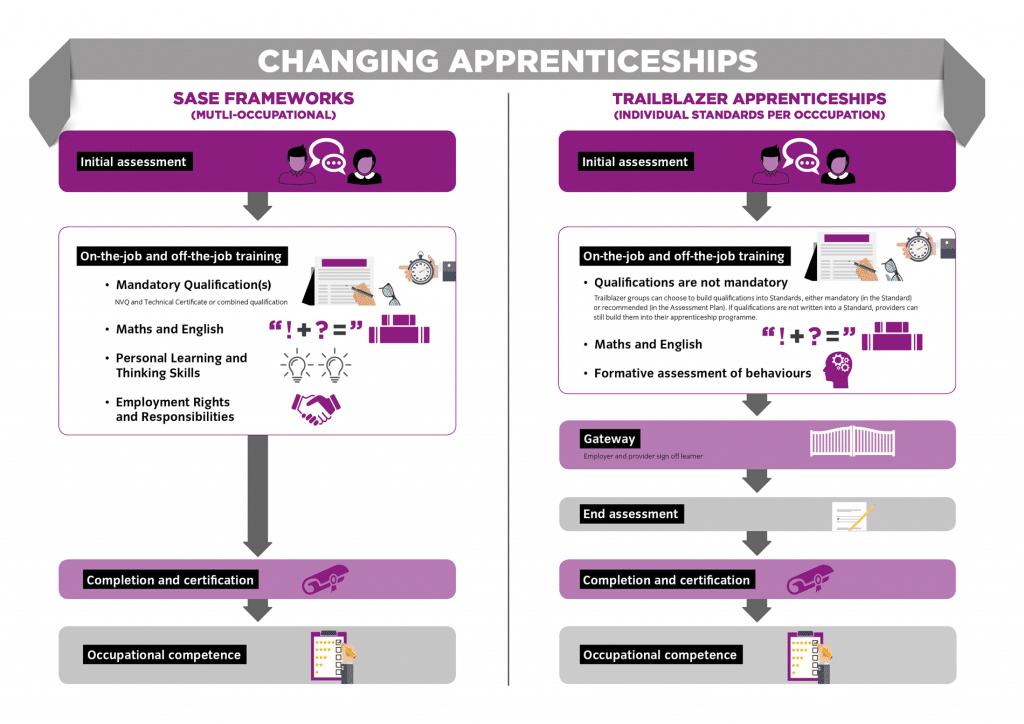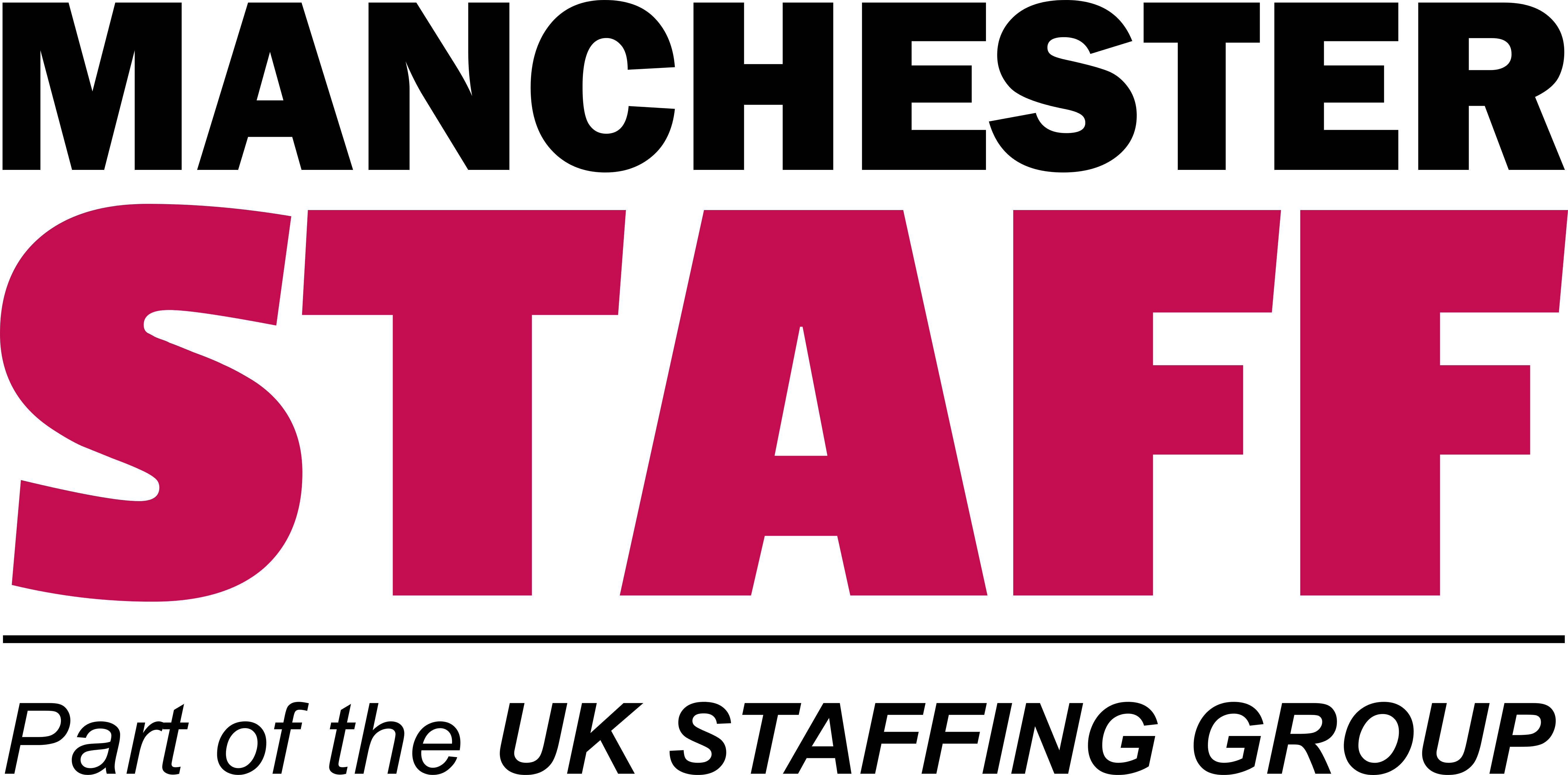
What are Apprenticeship Standards?
Simply put, Apprenticeship Standards are a new type of employer developed apprenticeship that provides a more robust learning experience and ensures the apprentice develops the right competencies and skills needed to succeed in their given industry and job role. This puts Employers firmly at the forefront of the development of Apprenticeships, creating people with real business and industry level skills.
They are totally different from the existing Frameworks that we have been using in the past. There is a heavy focus on the apprentices’ competences which must be assessed independently at the end of the apprenticeship where they will be awarded a pass, merit, or distinction.
[symple_spacing size=”20″]
What are Apprenticeship Trailblazers?
You may have heard the term “Trailblazers” this part will give a brief explanation. Back in 2012 there was a full Government review of apprenticeships and it was announced that there were going to be reforms in the way in which apprenticeships will be created, funded and delivered. The Government tasked employer led groups known as “Trailblazers” to redesign the apprenticeship frameworks for their industry specific sector in order to create more robust apprenticeships that provide the right skills for the right industries. As the apprenticeship is created by employers, for employers, you can be confident that your apprentice will be receiving the training needed to be an asset to your company.
“Apprenticeships made by employers for employers.”
These Trailblazers helped to create new Apprenticeship Standards which are a simple two-page document that clearly shows all the skills, knowledge and competencies that employers and industry experts felt an apprentice needs to succeed in their job role.
Which Employers (Trailblazers) were involved in the creation of these New Apprenticeship Standards?
A full list of employers that are involved in the Trailblazers who have helped to develop these Standards can be seen by downloading the PDF here
[symple_button url=”https://www.manchesterstaff.com/wp-content/uploads/2016/09/Employers_and_other_Organisations_Involved_in_Trailblazers.pdf” color=”pink” size=”large” border_radius=”3px” target=”self” rel=”” icon_left=”” icon_right=””]Download Trailblazer Employer List[/symple_button]
[symple_spacing size=”20″]
So What is the Difference Between Apprenticeship Frameworks and Standards?
The handy info-graphic by City & Guilds highlights the key differences between apprenticeship frameworks and apprenticeship standards. A key difference is that the new Apprenticeship Standards have a more rigorous end-point assessment that replaces the older mandatory qualifications in Frameworks.
The final assessment will entail:
- Portfolio – Evidence of real work projects completed during the apprenticeship and cover the requirements in the apprenticeship standard
- Synoptic project – Apprentice can undertake business related project away from work place (1 week)
- An employer reference – The employer will need to Sign-off and provide a reference regarding the quality of the apprentice’s work
- Interview – An assessor will explore what has been produced in the portfolio and projects and check for occupational competence
Apprenticeship Standards Manchester | For more info call us on 0161 870 9690

Source: City & Guilds
[symple_spacing size=”20″]
Which Apprenticeship standards have been approved for delivery?
Click the download buttons to view all the Apprenticeship Standards that are currently approved for delivery or a list of the Standards still in development.
[symple_button url=”https://www.manchesterstaff.com/wp-content/uploads/2016/09/Standards_approved_for_delivery_-_06092016.xlsx” color=”pink” size=”large” border_radius=”3px” target=”self” rel=”” icon_left=”” icon_right=””]STANDARD APPROVED FOR DELIVERY[/symple_button] [symple_button url=”https://www.manchesterstaff.com/wp-content/uploads/2016/09/Occupations_approved_for_the_development_of_an_apprenticeship_standard-1.pdf” color=”pink” size=”large” border_radius=”3px” target=”self” rel=”” icon_left=”” icon_right=””]STANDARDS IN DEVELOPMENT[/symple_button]
[symple_spacing size=”20″]
How the Apprenticeship Standard Process Works
Apprenticeship Standards Manchester | Our apprentice recruitment and consultancy service it totally FREE for local employers.
[symple_tabgroup][symple_tab title=”Stage 1″] The first step is for the employer to select their apprentice. Here at Manchester Staff Ltd our apprentice recruitment service is totally free. We will advertise your vacancy, conduct pre-screening interviews, then arrange formal face to face interviews with your company. Don’t forget, you can also enroll existing staff onto an apprenticeship standard, and unlike the old frameworks, age is no longer a restriction. In addition, even if your employee has a degree, they can still do the apprenticeship standard so long as the degree isn’t in the same subject area. [/symple_tab][symple_tab title=”Stage 2″] Once you have an apprentice in place, the next thing to do is to select a training provider. Here at Manchester Staff Ltd we will use our vast FE connections to source a training provider for you. We will help to negotiate the costs of the apprenticeship and keep you fully informed of what you will expect to pay, when, and what grants you will be able to receive. Of course, for Apprenticeship Standards Manchester our service is free of charge for the employer. [/symple_tab][symple_tab title=”Stage 3″] Once an apprenticeship agreement is signed by the employer, training provider and the apprentice, your apprentice will be ready to start training. You will also receive a full payment schedule and timetable outlining when you will receive your grant payments. We will make all the arrangements and book an appointment with your company and the provider to start the enrollment process. [/symple_tab][symple_tab title=”Stage 4″] Your apprentice will now start work and the apprenticeship qualification will be delivered alongside work based learning [/symple_tab][symple_tab title=”Stage 5″] Depending on the type of apprenticeship standard and pending training schedule and delivery method, your apprentice may attend classroom workshops. This normally occurs in 1 week blocks every 2-3 months, but this can vary. Before your apprentice starts, we will make sure you have a schedule and are fully informed. [/symple_tab][symple_tab title=”Stage 6″] Once your apprentice completes the Qualification, an End-Point assessment takes place by an independent assessor. Your apprentice will be awarded pass, merit or distinction. [/symple_tab][symple_tab title=”Stage 7″] You then apply for the Apprenticeship certificate through ACE and the training provider will apply for the Completion Payment from the SFA and then pays the employer their completion bonus payment. [/symple_tab][symple_tab title=”Stage 8″] Congratulations! The process is now complete. You may now progress your apprentice onto a higher level qualification if you choose to continue with their personal development. For more info regarding Apprenticeship Standards Manchester, call us anytime on 0161 870 9690[/symple_tab][/symple_tabgroup]
[symple_spacing size=”20″]
How Does Apprenticeship Standard Funding Work?
-
Businesses that DO NOT pay the Levy
The latest proposal is that these employers will have to pay just 10% of the apprenticeship cost, with 90% of apprenticeship training costs being paid for by the Government Levy funds. In addition, for small employers with fewer than 50 employees it has been proposed that the Government pays the full 100% of the training if the employer takes on 16- to 18-year-old apprentices or 19- to 24-year-olds formerly in care or who have an EHCplan. So if you employ a 19-24 year old who has not been in care, you will need to pay a 10% contribution. I will share examples of the proposed prices below, so you can get an idea of costs.
Basically all apprenticeship frameworks and standards starts from April 2017 will be funded from one of 15 bands, each with an upper limit ranging from £1,500 to £27,000. It will then be up to employers to negotiate prices with providers.
Here is an example of how this may work:
- Employer chooses apprenticeship in band 5 with a maximum price of £3,500
- Employer negotiates a price of £3,000 with their provider
- Government co-invests 90% = £2,700
- Employer co-invests remaining 10%= £300
- The Employer will pay the full £3000 over the course of the apprenticeship, but will receive payments from the Government for £2700 at various stages to offset the cost. This costing the employer just £300 overall.
-
Businesses that DO have to pay the levy
Once you have declared the levy to HMRC you will be able to access funding for apprenticeships through a new digital apprenticeship service account. It is proposed that employers who have to pay the Levy (those with annual payroll bills over £3m) will get a 10% automatic monthly top-up. However, if their levy account is insufficient then like smaller employers, 90 per cent of their additional apprenticeship training costs will be subsidised. So for every £100 that enters your digital account to spend on apprenticeship training, you get £110.
For further levy information please click here to read our FAQ article.
[symple_spacing size=”20″]
Apprenticeship Standards Manchester
If you want to employ apprentices or enroll your existing staff onto apprentice standards Manchester, get in touch today. As an apprenticeship recruitment agency, our service is FREE for employers.
[symple_spacing size=”20″]
[gravityform id=”2″ title=”true” description=”true”]

